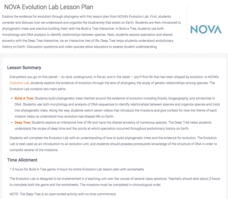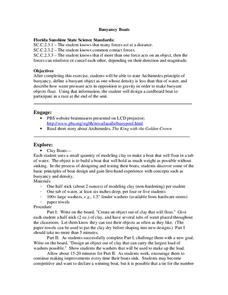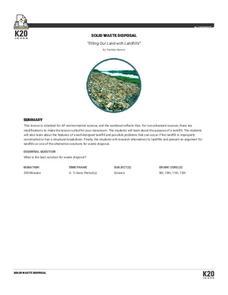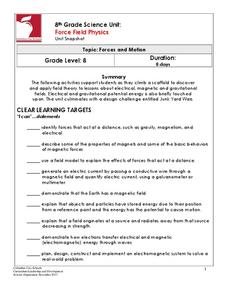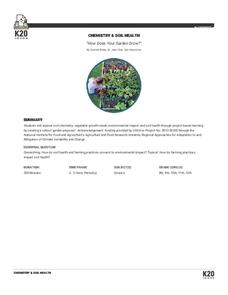NASA
Stellar Fingerprints and Doppler Red Shifts
Young scientists observe the spectra of elements and compare that to the Doppler effect. Hook scholars from the beginning all the way to the extension activities in this 5E-format lesson plan.
PBS
NOVA Evolution Lab Lesson Plan
It doesn't matter if you look on land, in the air, underground, or in water—evolution is everywhere. Scholars complete worksheets with multiple question types as they progress through six online missions creating phylogenic trees.
Polar Trec
Science in Antarctica
PolarTREC brings polar researchers and educators together to benefit both science and education. Pupils select one research project in Antarctica to explore and present to their peers. Scholars polish research and presentation skills as...
American Chemical Society
Changing State: Evaporation
Why do experiments require a control? Guide scholars through designing an experiment to see what they can do to evaporate water faster with a instructional activity that stresses the importance of controlling all variables. The second...
American Chemical Society
Finding Volume: The Water Displacement Method
We have formulas for finding the volume of geometric shapes, but what if the shape is irregular? Lesson describes how to find volume through water displacement. After a demonstration, scholars practice in small groups. Then analysis...
American Chemical Society
Density of Water
We know solids have a density we can measure, but what about liquids? Lesson explores this concept and allows scholars to explore the relationship between volume and density. Graphing and analysis questions round out the activity.
American Chemical Society
Density: Sink and Float for Solids
Steal cubes sink, but steal ships float. Lesson explores the density of solids as well as the density of water in determining what will sink and what will float. A hands-on group activity helps pupils see that weight and volume are two...
American Chemical Society
Controlling the Amount of Products in a Chemical Reaction
Everyone enjoys combining baking soda and water. Here is a lesson that challenges scholars to analyze the reaction three different ways — the real substances, the chemical equation, and the molecular models. Class members experiment to...
University of California
Hot! Hot! Hot!
Calories are not tiny creatures that sew your clothes tighter every night, but what are they? A science instructional activity, presented at multiple levels, has learners experiment with heat, heat transfer, and graph the function over...
American Chemical Society
Molecules Matter
Did you know that jumping spiders sometimes wear water droplets as hats? A seventh grade science lesson plan introduces the concept of what makes up water: tiny molecules that are attracted to each other. Starting with a chemistry...
American Chemical Society
Molecules in Motion
I heard that oxygen and magnesium were going out and I was like "O Mg." Pupils experiment with adding food coloring to water of various temperatures in order to determine how temperature impacts molecular movement. This is the...
Science 4 Inquiry
Frenemies, Bros and Killers: A Lesson in Symbiosis
Animals and plants develop relationships and rely on each other to survive. Pupils learn more about symbiosis through a video, a hands-on matching activity, and a game. They differentiate and describe each type on a written evaluation.
NASA
Tools of the Trade
Did you know every state in the U.S. has at least one observatory? During the lesson, scholars research the cost of building and maintaining an observatory. They must present their information in a proposal to build a new observatory,...
NASA
Unsung Heroes of Science
Scholars research scientific heroes who haven't been given enough credit for their discoveries. While many are women, there are also men to whom credit is overdue.
PBS
NOVA Cloud Lab Lesson Plan
A sign that washed away from Hurricane Sandy in 2012 beached itself 3,595 miles away in France. This artifact and others from around the world help scientists understand water currents and the far-reaching impact of hurricanes. Scholars...
NASA
Two Versions of Gravity: Newton and Einstein
We have all heard the debate about teaching both theories, but an innovative lesson plan takes the discussion to a new level. Scholars research and debate Newton's Law of Gravitation versus Einstein's General Theory of Relativity with...
Discovery Education
Sonar & Echolocation
A well-designed, comprehensive, and attractive slide show supports direct instruction on how sonar and echolocation work. Contained within the slides are links to interactive websites and instructions for using apps on a mobile device to...
Center for Precollegiate Education and Training
Buoyancy Boats
What did the sea say to the boat? Nothing, it just waved. An inquiry-based lesson starts with a simple concept on the Archimedes Principle and challenges pupils to make something out of clay that floats. Then, they design an object out...
American Chemical Society
Moving Molecules in a Solid
Who likes magic shows? In the fourth of five lessons, pupils view a scientific magic trick. The ball fits through the ring easily, but then moments later, it won't pass through anymore. What changed? Can we reverse the change? Scholars...
K20 Learn
Filling Our Land with Landfills: Solid Waste Disposal
New ReviewThough it comprises only 5 percent of the world's population, the US generates 40 percent of the world's waste. Scholars learn about landfills, their safety, and other solid waste methods. They use experiments and research to learn more....
Columbus City Schools
Get Your Organisms Organized
From large to small, show your class how to organize them all! Included within the guide is everything you need to take their knowledge of classification from the cellular to the species level. The worksheets focus on building vocabulary...
Columbus City Schools
Force Field Physics
Attracted class members to an activity-packed journey through the science behind the invisible forces at work all around us. From jump rope generators to junkyard wars, there's never a dull moment when eighth grade physics scholars...
Columbus City Schools
Changes All Around Us
Whoa! What just happened? That's right, change is everywhere. But what exactly is changing? Middle school science sleuths get to the bottom of the changes matter can experience. Through simple demonstrations, engaging videos, and an...
K20 LEARN
How Does Your Garden Grow?
Seventy thousand different types of soil exist in the United States alone. Young scientists learn about the importance of soil to the food supply. They test soil for a variety of factors and determine the best place to set up a community...



